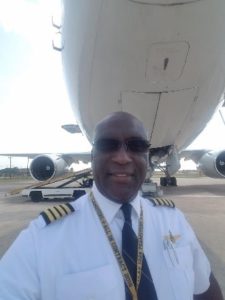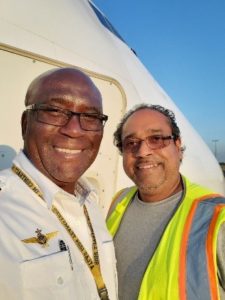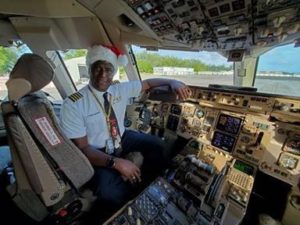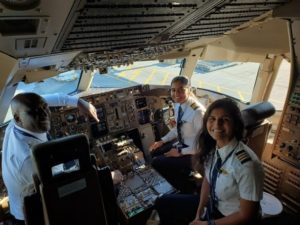
Captain Cyprian Honore.
What is your current title and how long have you been at Atlas?
I am a Captain on the B767 and based out of JFK. I’ve been with Atlas for eleven and a half years.
What are your primary responsibilities in your role at Atlas and what is your favorite part of the job?
As captain, my primary role is the safe, regulatory compliant and efficient operation of the flight while maintaining scheduling integrity and passenger comfort. My favorite part of this job is taking care of our men and women in uniform.
How did you find Atlas?
I was made aware of Atlas Air and its potential by a friend from college, Stanley O’Brien, who was working in maintenance at Atlas.

Cyprian Honore and Stanley O’Brien.
How did you find your way into aviation? What prompted you to consider aviation as a career?
Growing up in Grenada, my stepdad was a licensed aircraft mechanic. He would come home after work with all of his manuals and he would talk about “drag” and “lift.” I was fascinated by what he did and at seven or eight years old, I knew I wanted to be in aviation someday. The road was long and it wasn’t easy, but I stayed the course. I received my Associate’s Degree in Avionics Technology at Vaughn College of Aeronautics, followed by a Bachelor’s Degree in Aircraft Maintenance; both of which served as a springboard to fund the completion of my flight training.
What does Black History Month mean to you? Why is it important?
Black History Month, to me, is a period of reflection dedicated to the contributions of African Americans for a better quality of life for the wider society, as well as highlighting the need for a more equitable and just society. I had the opportunity on one of my trips, to tour the Island of Gorée,** “the door of no return,” in Senegal. That experience left an indelible mark on me, and it reinforced the critical need to commemorate Black History Month. I think about what we have overcome, and I am very proud. My great-grandmother was born in 1878, and although slavery had been abolished, conditions on the plantations were not much improved. So I am not that far removed from all of this, yet today I am flying airplanes. It’s pretty amazing.
Does anyone or anything come to mind when you think of the contributions made by the Black community throughout American history?
I immediately think of Booker T. Washington, given the impact he had on the generational advancement of African Americans. He advocated and cultivated the spread of vocational schools and colleges for African Americans across the south. As president of Tuskegee University, Booker T. Washington showed oppressed people they could advance through education and becoming self-sufficient. I first learned about Booker T. Washington in primary school and his commitment to uplifting our race struck a chord and stayed with me over the years. When I’m not on the line and home in Grenada, I visit the primary school in the village where I grew up and speak to the children about the importance of education as a stepping stone to getting out of poverty and transforming one’s life. Black History Month has given me a calling – how do I assist the underserved in fulfilling their dreams?

Captain Honore in the cockpit.
Who do you consider to be the strong Black leaders of today who are currently making history, and how have they impacted you?
Among today’s strong black leaders, Robert F. Smith, an investor, inventor, engineer, philanthropist and entrepreneur, is an outstanding example of someone who possesses both academic excellence and business savvy and a commitment to enhancing the lives of African Americans. In 2019, during his commencement address at Morehouse College – a historically Black Institution – he pledged to pay off the entire graduating class’ student loan debt. His gift helped almost 400 graduates. Another leader I admire is Dr. Kizzmekia Corbett, an American viral immunologist who was the team leader in the development of Moderna COVID vaccine.
What is your advice to young Black professionals considering aviation as a career?

Captain Honore with First Officers Monisha Lachiram and Harshaben (Harsha) Patel, both of whom are from India.
For young black professionals who are considering aviation as a career, education, networking with professionals in this field, and persistence will go a long way in ensuring a successful tenure in this noble field.
What does having a diverse workforce mean to you?
Having a diverse workforce is extremely important to me. Atlas Air is a striking example of such synergy. We are truly diverse, and I trust that this culture will continue.
What would your colleagues be most surprised to learn about you?

Food from Captain Honore’s garden.
Just about everyone who has flown with me knows that I have passion for farming. I think it’s in my DNA. My grandfather was a farmer. I grow all my own food, as well as a wide variety of exotic roses.
** The island of Gorée lies off the coast of Senegal, opposite Dakar. From the 15th to the 19th century, it was the largest slave-trading center on the African coast. It is estimated that 20 million African passed through the island between the mid-1500s and the mid-1800s. Today it serves as a reminder of human exploitation and as a sanctuary for reconciliation.